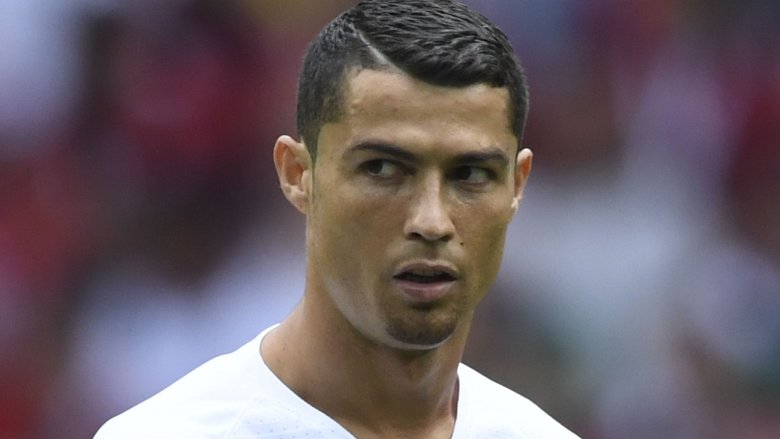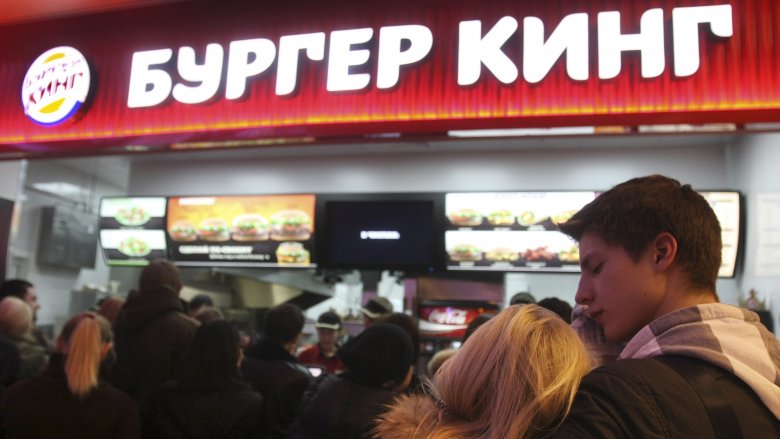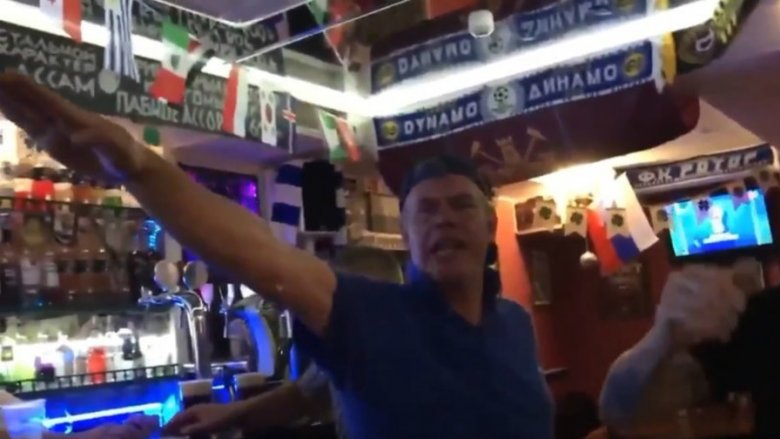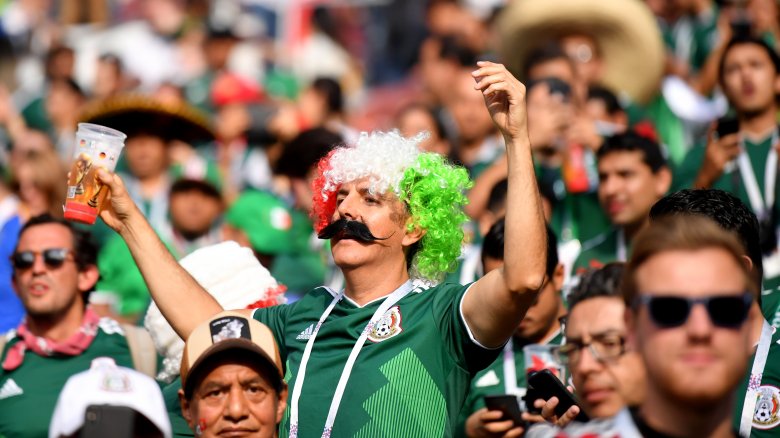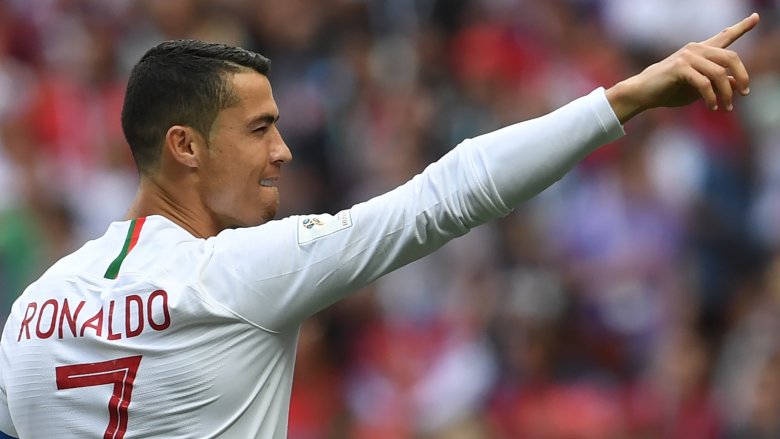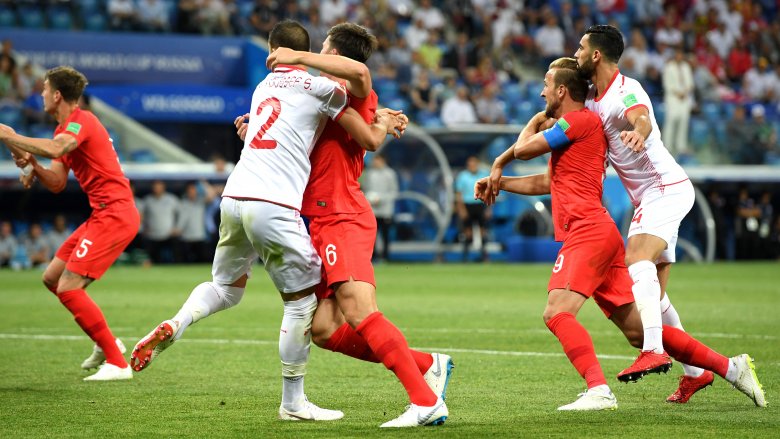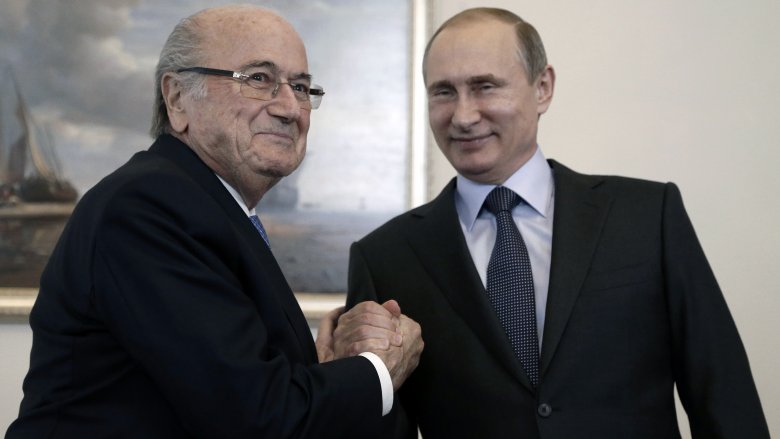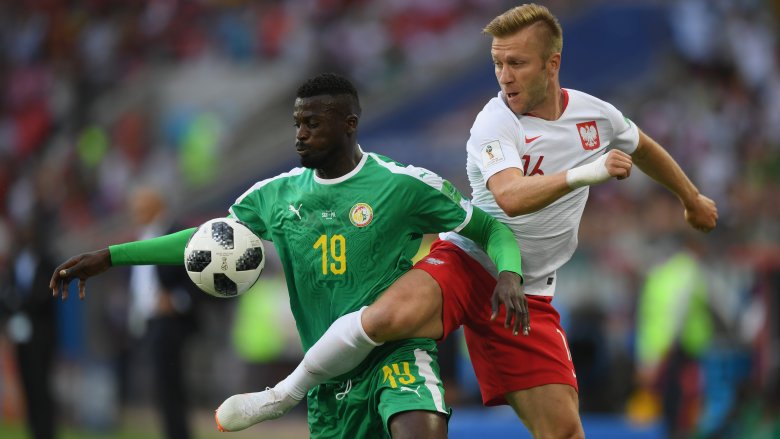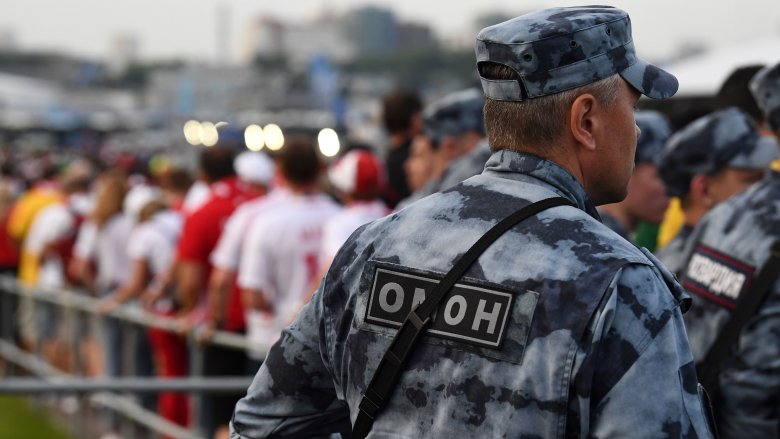Shadiest Moments At The 2018 World Cup
The history of the World Cup is littered with controversial and downright terrifying moments, but what separates the 2018 World Cup from the ones that came before it was that it began causing controversy long before a ball was even kicked.
A quick recap: Russia won the right to host the tournament in 2010, beating out strong bids from England, Holland, Belgium, Spain, and Portugal, but the Russian victory was marred by allegations of corruption. Even former British prime minister David Cameron openly accused Russia of buying the vote. The Russians were exonerated after a lengthy investigation by a U.S. prosecutor reported no "undue influence" during the voting process.
All of this drama was soon forgotten when the tournament itself finally got underway in June 2018, bringing with it a whole new batch of controversies. From shocking instances of racism, homophobia, sexism, and even assault to bizarre goals and advertising campaigns, these are the shadiest moments at the 2018 World Cup.
Burger King's outrageous offer
Fast food giant Burger King faced widespread backlash after it used social media to offer Russian women a free lifetime supply of Whoppers if they managed to get pregnant by a World Cup star during the tournament. According to Sky News, the post urged local ladies to seek out "the best football genes" so their offspring would "ensure the success of the Russian team for generations to come."
That offer was particularly inflammatory in Russia because this wasn't the first time the notion of Russian women hooking up with tourists has been up for debate there. Tamara Pletnyova, head of the country's parliamentary committee on children and families, urged Russian women not to enter into relations with foreigners during the World Cup unless they want to raise a child alone. Her colleague, MP Mikhail Degtyaryov, had the opposite view: "The more love stories we have connected to the world championship, the more people from different countries fall in love, the more children are born, the better," he said.
Burger King responded by removing the post from social media and apologizing for the uproar. "It was too offensive," a spokesperson said.
Anti-Semitic England fans
The English people put their lives on the line to fight the rise of Nazism in Europe during World War II, which makes this video of England fans doing Nazi salutes in Russia all the more shocking. Filmed in a bar somewhere in Volgograd (the location of England's opening game and the site of the WWII battle of Stalingrad,) the clip shows a handful of white Englishmen singing songs about Auschwitz and using anti-Semitic slurs, all while giving the controversial salute.
"We strongly condemn the actions of the people in this video," the English Football Association said in a statement (via Sky Sports). "We are working with the relevant authorities, including the UK Police investigations team, who are making enquiries to identify the individuals involved and take appropriate action. The disgraceful conduct of the individuals in this video does not represent the values of the majority of English football fans supporting the team in Russia."
A reporter was sexually harassed on live TV
The BBC's Vicki Sparks made sports history in 2018 when she became the first woman to commentate on a World Cup match. While numerous people took to social media to show their support, the journalist dealt with a number of male trolls — a stark reminder that sexism remains rife in the world of soccer, but Sparks' treatment paled in comparison to what happened to reporter Julieth Gonzalez Theran.
The Colombian journalist was giving a live broadcast from Saransk on the first day of the tournament when a man grabbed her breast and kissed her on camera. Her broadcaster, Deutsche Welle, branded the incident a "nonconsensual attack" on its employee, and Theran later took to Instagram to address what happened. "RESPECT!" she wrote (via The Huffington Post). "We don't deserve this. We are equally valuable and professional. I share the joy of football, but we must identify the limits of affection and harassment."
Homophobic chants from Mexico fans
Not many pundits gave the Mexico team much of a chance going into the tournament, but when it pulled off a win against Germany (the reigning champions and one the favorites) there was cause for celebration. Those smiles didn't last very long, however, because the team soon found itself in hot water with FIFA over the behavior of its fans. Soccer's world governing body hit Mexico with a $10,000 fine for what it called "discriminatory and insulting chants" used by Mexican fans. According to USA Today, the "anti-gay" chants were directed at German goalkeeper Manuel Neuer.
This isn't the first time the Mexican soccer federation has had to pay up because of homophobic behavior from its supporters. The nation has been fined repeatedly by FIFA over the years, something Mexico's star striker, Javier Hernandez, wants to put a stop to. The former Manchester United man took to Instagram to plead with Mexican fans, urging them to stop using slurs inside the stadium. "Let's not risk another sanction," he said (via The Guardian).
Did a referee really ask for the shirt off Ronaldo's back?
It's not uncommon for a soccer player to ask an opponent to swap shirts at the end of the game, especially when they come up against a star the size of Cristiano Ronaldo. The Real Madrid and Portugal powerhouse is probably used to other players asking for his shirt by now, but having a referee ask for it is certainly not the norm ... if that's what actually happened. According to Morocco midfielder Nordin Amrabat, referee Mark Geiger was so keen to get his hands on Ronaldo's game-worn jersey that he didn't even wait until the end of the game to ask for it.
"I do not know what he is used to, but he was very impressed by Cristiano Ronaldo," the outraged Amrabat said on Dutch TV (via SkySports). "I hear from [Portugal defender] Pepe that he asked in the first half if he should have his shirt. What are we talking about? At the World Cup? It's not a circus here." Ronaldo scored the only goal of the game as Portugal sent Morocco home, though the African nation didn't go quietly.
FIFA was forced to issue a statement regarding that jersey after Morocco called the match official's professionalism into question. The under-fire ref denied asking for the shirt, and FIFA backed him up, claiming Geiger acted in an "exemplary" manner and adding that it "unequivocally condemns" Amrabat's allegations.
Are the VAR up to par?
The introduction of video assistant referees (VAR) was supposed to make the 2018 World Cup the fairest one in history. Having a set of officials observing the game on monitors has certainly helped the referees detect foul play that they otherwise might have missed (ten penalties were awarded in the first week of the tournament alone,) but has it really made the game more just? That depends on who you ask, and if you ask England fans, they'll answer with a definitive no.
During England's opening game against Tunisia, England's star striker, Harry Kane, was blatantly bundled to the ground inside the penalty area by Tunisian defenders on two separate occasions, yet VAR Sandro Ricci failed to notify referee Wilmar Roldan about either offense. According to the The Telegraph, FIFA promised to examine the incidents, which looked more like wrestling than soccer. The UFC even got involved, offering Kane some "double leg takedown defence" ahead of England's next game.
This wasn't the only VAR controversy to take place during the group stages of the tournament. Brazil lodged a complaint with FIFA after VAR failed to spot a push on one of their players in the run-up to Switzerland's goal. The governing body dismissed that complaint, stating (via Fox Sports) that it would use VAR "only to eliminate clear and obvious mistakes by the officiating crew."
Banned Blatter crashes the party
The court of arbitration for sport tossed out an appeal from disgraced former FIFA president Sepp Blatter in 2016, declaring that his six-year ban from soccer should stand. Blatter was sacked after it was discovered that he'd approved a payment of almost $1.8 million to the Union of European Football Associations (UEFA) president Michel Platini, who was also banned from working in soccer as a result of the scandal. According to The Guardian, Blatter said the decision was "difficult" to take and has continued to protest his innocence.
The fact that he feels as though he did nothing wrong may be what emboldened him to show up at the 2018 World Cup. His appearance caused quite the stir and prompted a statement from his former place of work. "FIFA has taken note of Mr Blatter's visit to Russia," a spokesperson told BBC. "We have no further comment at the present stage."
Blatter was at FIFA's helm when Russia was controversially awarded the World Cup, and it seems though he and Russian President Vladimir Putin have remained close. It was reportedly Putin who invited Blatter to the tournament so they could take in a few matches, and they also met "at the Kremlin for small talk, drinks and some food," Blatter confirmed. He added: "Now I am here as a fan and not as FIFA president. It's great that I was invited by Russia."
Senegal's controversial winner
When a player gets injured during a game, the rules state that they must leave the field for treatment. When they're ready to return to the action, a referee waves them back onto the field, but this wasn't exactly how it went down during Senegal's Group H match with Poland.
Having been sidelined for treatment, Senegalese striker M'Baye Niang returned to the field of play just as Poland was executing a crucial long-distance back pass to its goalkeeper. The game was tied at a goal apiece at the time, but Niang was able to intercept the pass and take the ball past Polish goalkeeper Wojciech Szczesny to score the game-winning goal, much to the shock and and anger of the Polish team.
"It was kind of curious," Poland Coach Adam Nawalka told ESPN. "We were in possession. I'm convinced they didn't see the player coming off the sidelines. Wojciech tried to save the situation but he didn't manage it. We were very surprised, there was a lot of misunderstanding about it."
Sham supporters seeking asylum
Every four years, the World Cup takes center stage across the soccer-loving world. Coverage of the event dominates the headlines, often overshadowing other important news. As the 2018 World Cup got underway in Russia, the migrant crisis in Europe continued, and for those desperately trying to start a new life in a new country, the tournament provided the perfect cover.
Instead of asking everyone to apply for a visa, Russia reportedly issued visiting fans special World Cup IDs, but officials in Finland said those identifications can be abused by people seeking asylum. "Some people are likely to misuse this document for other purposes than those intended," an analyst from the Border Service of South East Finland said. "True, this was somewhat expected and we were preparing for such cases."
Despite preparations, the head of risk assessment at the Finnish Border Guard reportedly told Sputnik News that the organization was a "little surprised though that these cases happened at the beginning of the World Cup and in such numbers. We thought that this would happen only closer to the end of the competition, as the national teams will be dropping out."

